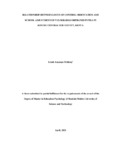| dc.contributor.author | Ochieng’, Linah Anyango | |
| dc.date.accessioned | 2021-05-20T08:12:49Z | |
| dc.date.available | 2021-05-20T08:12:49Z | |
| dc.date.issued | 2021-04 | |
| dc.identifier.uri | http://r-library.mmust.ac.ke/123456789/1458 | |
| dc.description | A thesis submitted in partial fulfilment for the requirements of the award of the Degree of Master in Education Psychology of Masinde Muliro University of Science and Technology | en_US |
| dc.description.abstract | Several pupils in Kisumu Central Sub County aged between 10 and 12 years who are orphaned and vulnerable are either not in school, have dropped out of school, or are at lower class levels compared to most of their age-mates. Information from Kisumu Central Children’s Office further indicate that orphaned pupils living in orphanages in the Sub County are doing poorly in school, suffer low self- esteem and tend to be psychologically disturbed. This study investigated the relationship between locus of control orientation and school adjustment of OVP in primary schools in Kisumu Central Sub County, Kenya. Specific objectives of this study were to: establish the relationship between external locus of control orientation and school adjustment of OVP in primary schools in Kisumu Central Sub County, Kenya; determine the relationship between internal locus of control orientation and school adjustment; examine gender differences in locus of control orientation and school adjustment; and investigate intervention strategies for locus of control orientation and school adjustment problems of OVP. The study was informed by Benard Weiner’s attribution theory. It adopted a convergent parallel mixed methods design. Snowball, purposive, and simple random sampling techniques were used to select 295 participants. Data was collected using a modified form of Nowicki-Strickland Locus of Control Scale for Children, a modified form of Teacher Rating Scale of School Adjustment, questionnaires and focus group discussions. Analysis of quantitative data involved descriptive and inferential statistics done with the aid of SPSS version 25 at .05 level of statistical significance and 95% confidence level. Analysis of qualitative data followed deductive framework approach. Results from quantitative study showed a statistically significant negative relationship between external locus orientation and school adjustment, no statistically significant relationship between internal locus of control orientation and school adjustment, and no statistically significant gender differences in locus of control orientation and school adjustment of OVP in primary schools in Kisumu Central Sub County. Findings from qualitative study revealed that school counselling failed to help OVP resolve parental death and school adjustment problems, that teacher-OVP relationship was low in emotional support, and that a small number of OVP living in orphanages got adequate care while majority living with relatives got inadequate care. Researcher recommended that school counselling aims at minimizing tendency towards external locus of control among OVP, teachers to make school environment more comfortable to OVP by being sensitive and approachable, caregivers to step up quality and quantity of care to minimize distress among OVP under their care, and that Ministry of Education Science and Technology sponsors school counsellors to ensure that only individuals who meet minimum professional requirements offer counselling services to learners in primary schools. | en_US |
| dc.description.sponsorship | MASINDE MULIRO UNIVERSITY OF SCIENCE AND TECHNOLOGY | en_US |
| dc.language.iso | en | en_US |
| dc.publisher | MMUST | en_US |
| dc.subject | LOCUS OF CONTROL ORIENTATION, SCHOOL ADJUSTMENT, VULNERABLE, ORPHANED PUPILS | en_US |
| dc.title | RELATIONSHIP BETWEEN LOCUS OF CONTROL ORIENTATION AND SCHOOL ADJUSTMENT OF VULNERABLE ORPHANED PUPILS IN KISUMU CENTRAL SUB COUNTY, KENYA | en_US |
| dc.type | Thesis | en_US |

